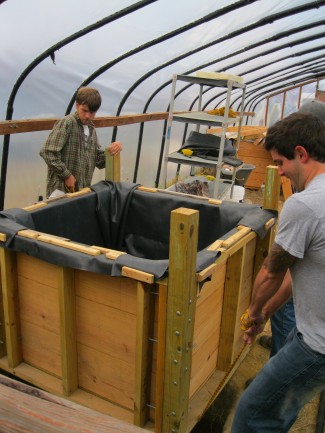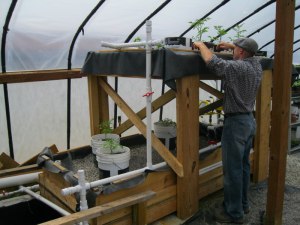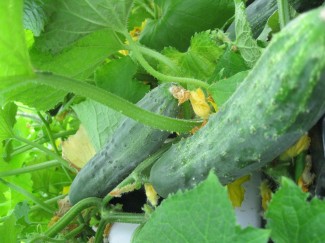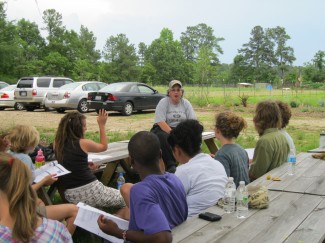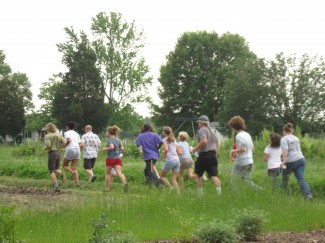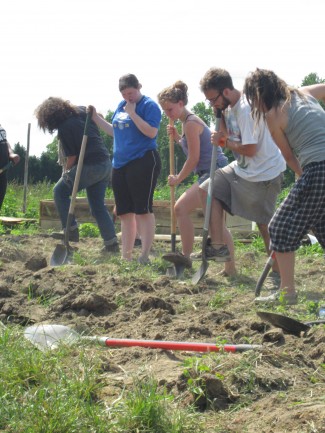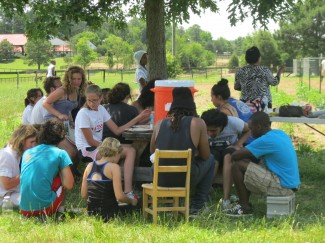An update from IFFS Garden Manager Kevin McDonough
On April 17th, the new Food Shuttle garden on the campus of BlueCross BlueShield of North Carolina was born.
BCBSNC is beginning a new initiative in partnership with North Carolina Recreation & Park Association (NCRPA) called Nourishing North Carolina, through which they will work with communities across the state to install or enhance a community garden in all 100 North Carolina counties. They felt it was thus important to have a garden on their Durham campus as well, and felt it was a great way for BCBSNC employees to learn, as well as a great way to partner with IFFS to address food insecurity and healthy eating in the Triangle. All produce grown in the garden is donated to IFFS to distribute to programs and agencies feeding the hungry and increasing access to fresh fruits and veggies for those in need. With the planting of tomatoes, peppers, buckwheat, basil, and squash, BCBS and IFFS staff began our new collaborative venture. Since those first tomato roots and buckwheat seeds touched soil, there has been much excitement and enjoyment at watching the garden grow and spending time together under the sun.
Along with the crops already listed, we have beets, swiss chard, sunflowers, parsley, radishes, spicy salad mix, and onions happily growing in the garden (with cucumbers, beans, okra, and sweet potatoes coming soon). Many have been impressed with how quickly everything has grown (and that only 5 weeks later we have harvested 25 pounds of salad mix, radishes, and squash!). Here’s hoping for continued abundance as we grow into the summer!
More than the production of fresh, healthy vegetables, we are making new relationships and connections in the garden. Dozens of BCBS staff have already participated in the weekly workdays and many more have enjoyed looking at and walking among the plants. Several groups of employees have committed to adopting/sponsoring a raised bed in the garden, meaning that they agree to care for the space throughout the 2012 growing season. Some groups have also added personal touches to their garden beds - gnomes, bird houses, and other decorative pieces of flair. Individual volunteers who register to work in the garden on a one-time basis come and enjoy spending time there as their schedule permits as well.
Gardening is an easy and natural place to make these connections and enjoy time together with people you may have not met otherwise. It is also a place for learning! In our workdays, we have talked about:
- fertilizing the soil with worm compost tea
- organic methods of disease and pest resistance
- how to build your own garden bed
- container planting
- permaculture
- soil amendments
Additionally, nutrition education staff from IFFS did a Food Matters cooking demonstration and shared recipes with us. We also planted kiwis and a Japanese snowbell tree! This is just the beginning, as we hope to expand on these topics and keep learning from one another. It is a joy to participate in this new garden and foster a stronger sense of community among IFFS, BCBSNC, and the greater Durham community. The connection to the community comes when we deliver the food to other agencies in Durham, providing produce to local families in need. The Food Shuttle already has strong partnerships with agencies that provide healthy food to those in need. The garden at BCBSNC will serve to strengthen this effort that is already under way.
It is with much enthusiasm that we celebrate what the garden has already brought to the health of ourselves, our organizations, and our community, and with much excitement that we plant the next seeds!
Many thanks to all,
Kevin McDonough
Garden Manager
To learn more about how to donate produce from your community or backyard garden, visit our Plant a Row for the Hungry page.








